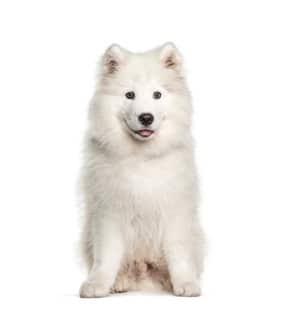
The Samoyed is a breed of dog that originated in the Siberia and was bred by the Samoyede people, a nomadic reindeer-herding group. It’s main purpose was to guard and pull the sleds of their herding families. It is a medium-sized breed with a thick double-layer white coat, pointed ears, dark eyes and a distinctive smile. There are also some variations in color, with some being black and white or cream-colored.
The breed is believed to have been created by crossing breeds such as the Yakutian Laika, Siberian Husky, and the Karelian Bear Dog. They are gentle, loyal and very friendly. They are considered great family dogs, as they love to be around children and other animals. Their thick coat makes them well-suited to cold climates, as they have a high tolerance for low temperatures. Plus, their distinctive white coat, smile, and ears make them quite unique!
The Samoyed is a very friendly and gentle breed of dog. They are highly intelligent and enjoy playing and participating in activities with their owners. They are very patient and tolerant, so they do great with children and usually get along with other pets. Early training and socialization is important with this breed in order to bring out its best qualities. They need regular exercise in order to keep their energy levels in check, so daily walks, runs, and playtime are ideal. They can be kept indoors, but can easily turn out to be noisy if not provided with enough activity. They are known to form very strong bonds with their owners, and can be an extremely devoted and loyal pet.
The Samoyed is an active and energetic dog breed, originally bred to serve in the subarctic regions. Responsible Samoyed owners should feed their dogs a nutritionally balanced diet that is formulated to their individual needs, and maintain regular feeding schedules to ensure adequate energy, growth, and physical development. It is important to ensure that the diet is not too calorie dense, as Samoyeds may be prone to excess weight gain. Meat is an important part of the Samoyed’s diet, but carbohydrates and fats sourced from fruits, vegetables, and grains should also be included. Samoyeds love natural treats such as fruits and vegetables, but they should be monitored carefully.
As with all breeds, regular exercise is important to maintain a healthy weight and well-being. Since Samoyeds can be sensitive to certain foods, it is important to research ingredients and to investigate potential allergies.
Health issues they may be predisposed to include hip dysplasia, hypothyroidism, Progressive Retinal Atrophy (PRA), and Cataracts. It is important for Samoyeds to have regular veterinary check-ups and get vaccinated to prevent illnesses. Preventive care can also help reduce the risk of medical issues. Additionally, regular grooming needs, such as brushing, bathing, ear cleaning, and nail trimming, should be done to keep their coat and skin healthy.
It is very important for Samoyeds to have a balanced diet with portion control to prevent obesity which can lead to other more serious health concerns. Regular exercise is also important for maintaining a healthy weight. Working with a veterinarian or behaviorist can help develop a customized plan for your Samoyed to ensure both their physical and mental health is being taken care of.
The Samoyed is a beautiful and friendly breed with a lifespan of 12-14 years.
To learn more about the Samoyed, responsible pet ownership, and nutrition, visit Way Canina. Here, owners can also discover what foods are best for their Samoyed and which to avoid. Ultimately, responsible pet ownership, regular exercise, and a nutritionally balanced diet ensure healthy and happy Samoyeds.
Are you a Samoyed owner, or thinking about getting one? Owning any breed of dog is a big responsibility and each one comes with its own set of pros and cons; make sure you consider them carefully before you make a decision. Take a look at our blog posts and articles on Way Canina to compare breeds and find out more about every dog’s lifestyle and wellbeing.